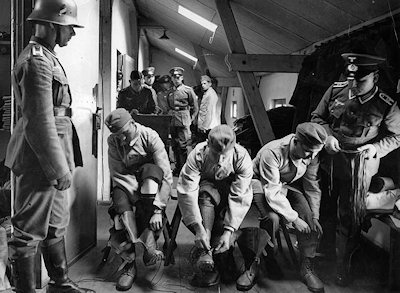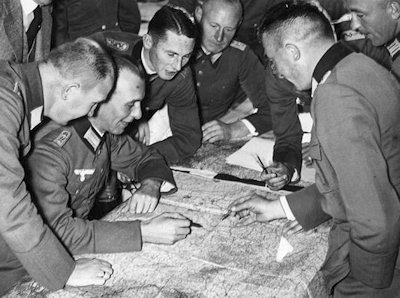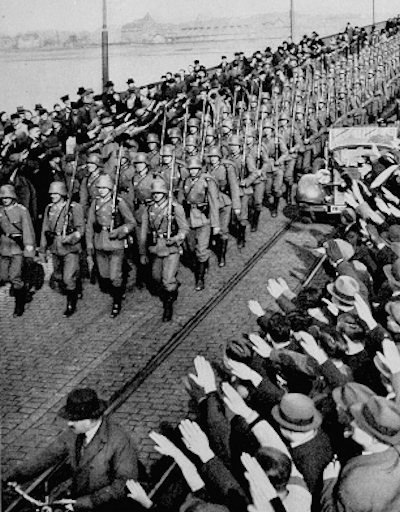![]()

Nazis March into the Rhineland
High above the town of Berchtesgaden in southeastern Bavaria, Adolf Hitler spent many hours in solitude at his mountain retreat with its magnificent views of the Alps and the valleys below. It was here that the Führer came to contemplate the future of Germany and to make all of his big decisions.
Sometimes he mulled things over for weeks or even months. But once the final decision was made, it was utterly unshakable and no one could ever convince him to change his mind.
On Friday, March 15, 1935, Hitler departed his mountain retreat and returned to Berlin. He immediately convened a Cabinet meeting and also assembled members of the Army's General Staff. He then announced a major decision he had just come to – Germany would openly defy the military limitations set by the Treaty of Versailles and re-arm.
No one in the room objected or voiced any concern. After the announcement, Nazi legal officials quickly set to work drafting the necessary laws, while Propaganda Minister Joseph Goebbels worked with Hitler to compose the actual proclamations to be read to Nazi Party members and the German people.
On Saturday, March 16th, the Cabinet and Generals met once again and listened to Hitler read the finished proclamations, after which all of those present gave a hearty 'three cheers' for the Führer. The proclamations were then announced to the world by Goebbels at a hastily called press conference.
June 1935 - Army conscripts are numbered and lined up for medical inspection at Potsdam. Below: Raw recruits in Berlin try on their first pair of Army boots. Below: Saturday, March 7, 1936 - German Army troops cross a bridge over the Rhine River and enter the Rhineland - for the first time since the end of World War I. The press was told the Führer had decided Germany was going to reintroduce military conscription (compulsory enrollment) and build a new Army consisting of 36 divisions, totaling 550,000 men.
This was actually a flagrant violation of Part V of the Treaty of Versailles signed by Germany back in 1919 after its defeat in World War I. Breaking the Treaty was an affront to Germany's former World War I enemies, France and Great Britain.
Everyone waited to see how they would respond to the news. Some of Hitler's more cautious Army generals thought there might even be an immediate military attack by France. But absolutely nothing happened, except for a few diplomatic protests.
Hitler, for the first time in his career, had gambled against Germany's old enemies and won. He knew France was suffering from serious political in-fighting and that Britain was in the grips of an economic depression. He wagered that the two countries, given their internal problems, didn't have the stomachs to respond militarily. And he was right.
But Hitler still found it necessary to soothe the jangled nerves of the world's democracies and Germany's next door neighbors. On May 21st, two months after the conscription announcement, he appeared before the Reichstag in Berlin and delivered a conciliatory speech. "Germany wants peace...None of us means to threaten anybody," Hitler declared. He then announced a thirteen-point peace program containing all kinds of promises such as: Germany will respect all other provisions of the Treaty of Versailles including the demilitarization of the Rhineland; Germany is ready to cooperate in a collective system for safeguarding European peace; and the German government is ready in principle to conclude pacts of non-aggression with its neighbors.
Hitler's method of diplomacy in dealing with the gun-shy Western democracies was thus established. His original bombastic announcement was usually made on a Saturday to catch the other governments off-guard. It came in the midst of an ongoing action, or after the fact, and was followed by a conciliatory speech full of reassuring promises.
Between Hitler's gambles, there would be a considerable lapse of time, during which he returned to Berchtesgaden, contemplating his next move like a chess master pondering all of the potential outcomes.
Hitler's next big move in the game of international diplomacy didn't occur until a year later and it would be one of the biggest risks of his entire career. Beginning at dawn on Saturday, March 7, 1936, three battalions of the German Army crossed the bridges over the Rhine and entered into the industrial heartland of Germany known as the Rhineland. This demilitarized area included all territory west of the Rhine River extending to the French border as well as a portion east of the river including the cities of Cologne, Düsseldorf and Bonn.
At 10 a.m. that morning, Hitler's Foreign Minister, Constantin von Neurath, summoned the ambassadors of France, Britain, and Italy, and handed them a lengthy memorandum stating that the German government had "restored the full and unrestricted sovereignty of the Reich in the demilitarized zone of the Rhineland."
This was another gross violation of the Treaty of Versailles.
At noon, Hitler appeared before a hastily called Reichstag assembly, accompanied by several visibly nervous Army generals. The six hundred Reichstag members in attendance had no idea what was happening. As soon as Hitler informed them that German troops were on the march into the Rhineland, they jumped to their feet amid wild cheering for the Führer and shouts of 'Heil!'
When they calmed down, Hitler solemnly promised: "First, we swear to yield to no force whatever in the restoration of the honor of our people, preferring to succumb with honor to the severest hardships rather than to capitulate. Secondly, we pledge that now, more than ever, we shall strive for an understanding between European peoples, especially for one with our Western neighbor nations...We have no territorial demands to make in Europe!...Germany will never break the peace."
Once again, the whole world waited to see how the French and British would react. German troops entering the Rhineland even had orders to scoot back across the Rhine bridges if the French Army attacked. But in France, the politicians were simply unable to convince their generals to act, and were also unable to get any British support for a military response. So they did nothing. The French Army, with its one hundred divisions, never budged against the 30,000 lightly armed German soldiers occupying the Rhineland, even though France and Britain were both obligated to preserve the demilitarized zone by the Treaty of Versailles and the subsequent Locarno Pact of mutual assistance.
It had been a tremendous gamble for Hitler, one that might have cost him everything if his troops had been humiliated by their old enemies. Later, Hitler would privately admit: "The forty-eight hours after the march into the Rhineland were the most nerve-racking in my life. If the French had marched into the Rhineland, we would have had to withdraw with our tail between our legs, for the military resources at our disposal would have been wholly inadequate for even a moderate resistance."
Some of Hitler's top Army generals had gotten cold feet during the maneuver. Only Neurath, his Foreign Minister, had calmly assured him: "You can risk it. Nothing will happen." Hitler would never forget the fearful behavior exhibited by some of his top generals during his first military venture. As a result, their cautious advice would often be ignored in the future.
In the Rhineland, German Army troops marching under the Swastika banner were met by German priests conferring blessings upon them and women tossing flowers into their path. In Cologne, the people went wild with joy. Inside Cologne's Catholic Cathedral, Cardinal Schulte even praised Hitler for "sending back our Army."
A few weeks later, on March 29th, a nationwide referendum was held in which 99 percent of the registered voters in Germany went to the polls and gave a 98.8 percent "Ja" vote approving Hitler's reoccupation of the Rhineland. The Führer had reached new heights of popularity.
After this victory, Hitler once again went back to his mountain retreat at Berchtesgaden to relax and ponder his next move. Meanwhile, in Berlin and throughout Germany, preparations were underway to host the coming Summer Olympics. For the Nazis, the Berlin Olympics would be an opportunity to show off the New Order to people from all over the world. It would also be a chance to impress everyone with the natural superiority of Nazi athletes.
Copyright © 2001 The History Place™ All Rights Reserved
![]()
| NEXT SECTION - The Berlin Olympics Triumph of Hitler Index The History Place Main Page |
 Map
of Germany showing major Map
of Germany showing majorpre-war land acquisitions by Hitler. |
Terms of use: Private home/school non-commercial, non-Internet re-usage only is allowed of any text, graphics, photos, audio clips, other electronic files or materials from The History Place.



